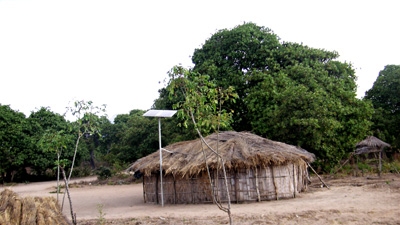MAPUTO, April 4th, 2012 -- In Nampula Province, Northern Mozambique, about 2,700kms from the capital Maputo, some 50 solar Photovoltaic (PV) systems have been successfully installed in schools and clinics since 2009. This means that children can study after dark, and patients get refrigerated medicines and light throughout the evening, a major boost to the healthcare system in the small village.
Across the country, in the central provinces of Tete and Manica, and further to the south in Maputo, PV systems, improved biomass cook stoves and other Renewable Energy Technologies (RET) are in being installed in rural villages, offering a model that can be replicated beyond schools and clinics to include agriculture, household, and small businesses over time.
These advances are due to Mozambique’s multi-pronged approach to developing the energy sector. The aim is to bring electricity access more rapidly to over half the population estimated to be living in poverty.
"Mozambique is implementing a very ambitious strategy to accelerate energy access as a key plank of the country's poverty reduction strategy,” says Rob Mills, World Bank Energy project lead in Maputo.
While the majority of the new access in the country has come from grid extension, intensive rural electrification efforts have benefitted around 2.8 million Mozambicans, primarily through micro hydro and photovoltaic solar systems (PV). These systems require a high level of maintenance. To that end, concerted efforts are being made to build the capacity of local operations staff and technicians to ensure these solutions for rural areas are sustainable.
The government approach includes exploiting resources such as large hydro and natural gas (including via private sector investment); extending the reach and improving the quality of electricity supplied via the national grid; and finding small-scale, stand-alone, renewable solutions that work for remote rural areas.
“With our hydro potential, natural gas reserves and exploitation of solar energy, we can expand government backed projects that have a strong social growth element,” says Mozambique’s Minister for Energy, H.E. Salvador Namburete
The World Bank is currently in the second phase of a wide-ranging $120 million program to help support this energy access scale up. Investments in Mozambique using International Development Association resources include extending the existing grid networks in the fast-growing 'peri-urban' areas in major cities, extending access to energy in rural areas through renewable off-grid solutions (notably the large program of solar photovoltaic systems in schools and clinics countrywide), and building government and regulatory capacity within the energy sector.
Supporting Mozambique’s energy sector planning, policy, and institutional development is ongoing. This includes helping to elaborate a national Rural Electrification Strategy and Investment Program , technical assistance and consulting. Basic institutional strengthening and capacity building for staff within the main sector agencies, in particular the Ministry of Energy, Electricidade de Mozambique (EdM), Fundo Nacional de Energia (FUNAE) and Conselho Nacional de Electricidade (CNELEC).
The World Bank is also helping mainstream a comprehensive donor partnership framework to make sure there is coordinated and sustained financing of investment, aligned with national priorities and procedures.
Among the government’s larger regional projects is a cross-border ‘backbone’ transmission project currently in preparation. This aims to resolve some of the bottlenecks in the transmission system while supporting regional economic development. The plan is to develop a national grid able to transmit 9200 MW in a secure and stable manner from northern Mozambique to the south and Maputo, where the excess power will be exported to South Africa and further to Southern Africa Power Pool SAPP.
“This is our golden moment to create the right conditions to fight poverty,” according to Namburete, “and we don’t intend to miss it.”

